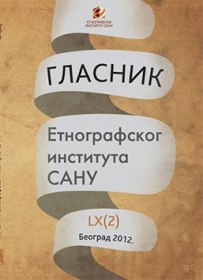Двадесет година после: рат (ни)је почео на Максимиру
DOI: 10.2298/GEI1202201D УДК: 316.774:316.75(497.11+497.5)"199/..." ; 32.019.5(497.1)"1990" ID: 193789964
Сажетак
Циљ овога рада јесте анализа медијских наратива везаних за никада одиграну фудбалску утакмицу између Динама из Загреба и Црвене Звезде из Београда, заказану за 13. мај 1990. године. Текст се фокусира на медијске записе двадесет година након овог догађаја, у контексту чињенице да је, временом, ова утакмица прибавила практично митски статус, симболички означавајући почетак рата у бившој Југославији. Предмет испитивања били су медији из Србије и Хрватске, са циљем да се укаже на стратегије представљања овог догађаја у периоду нормализације односа у региону. Анализа указује на то да се приступ унутар јавног дискурса није значајно променио. Медији у Србији овом догађају нису посветили превише пажње, а уколико су то и чинили, углавном је инсистирано на "невиности" српске стране, односно – на чињеници да је читав догађај унапред испланиран како би нова хрватска власт постигла политичке циљеве који су водили остваривању независности. Може се закључити да се у српском јавном простору о овом догађају заправо много више ћути но што се о њему говори. Управо овакав приступ присутан је у јавном дискурсу Србије када се говори о ратовима из деведесетих година ― ради се о недостатку било каквог консензуса и стратегије везане за суочавање са одговорношћу за учешће у ратовима на простору бивше Југославије. У Хрватској, за разлику од Србије, максимирска догађања функционишу као оснивачки мит. Двадесет година касније, када је независност успостављена и додатно учвршћена победом у "Домовинском рату", сећање на овај догађај снажно је и неупитно. Уклапајући се у ширу митску слику рата, максимирски догађаји представљају слику новог почетка, а нелагодна се сећања, попут бројних цивилних жртава и избеглих Срба, на известан начин заобилазе задржавањем националистичког дискурса, у оквиру кога се "непријатељ" искључује помоћу различитих стратегија. Може се закључити да метафора Максимира и даље функционише јавним наративима у Србији и Хрватској, служећи и данас као оквир за разумевање ширих политичких прилика у ове две земље и указујући на то да националистички дискурси и даље траже свог "значајног другог" у најближем комшилуку/сусједству. Легитимишући се кроз "непријатеља", успоставља се идеологија која заправо замагљује било какву потенцијалну дебату ван премиса које су унапред и одавно задате.
Кључне речи: фудбал, Максимир, медији, национализам, национална митологија
Reference
hegemony of homogeneity in the British press reportage of Germany
versus England during Euro 2000" Discourse and Society 14(3): 247–271.
Čolović, Ivan, 2000. Politika simbola, Beograd: XX vek.
Dežulović, Boris, 2010. "Kraj derbija Dinamo-Zvezda dugog 20 godina." Globus,
May 25 2010
Đerić, Gordana, 2008a. "Semantika ćutanja, nasilje i društveno pamćenje: intima
hrvatske i srpske politike." in Intima javnosti, Gordana Đerić (ed.), 64–97,
Beograd: Institut za filozofiju i društvenu teoriju i Fabrika knjiga.
Đerić, Gordana, 2008b "Nasilje u društvenom pamćenju. Intima hrvatske i srpske
javnosti povodom operacije Oluja" Filozofija i društvo XIX (1): 43–68.
Ђорђевић, Иван, 2006. "Спорт и национални идентитет. Фудбалска прича
'непостојеће нације'" Antropologija 1, 22–34
Đorđević, Ivan, 2009. "Umeju li antropolozi da igraju fudbal? Sport i identitet u
savremenoj Srbiji" Antropologija 9, 89–103.
Jansen, Stef, 2001 "Svakodnevni orijentalizam: doživljaj 'Balkana' / 'Evrope' u
Beogradu i Zagrebu, Filozofija i društvo XVIII: 33–71.
Jusić, Tarik, 2008. "Medijski diskurs i politika etničkog sukoba: jugoslovenski
slučaj" in Intima javnosti, Gordana Đerić (ed.), 40–63, Beograd: Institut za
filozofiju i društvenu teoriju i Fabrika knjiga.
Kuljić, Todor, 2006. Kultura sećanja: teorijska objašnjenja upotrebe prošlosti,
Beograd: Čigoja štampa.
Kuljić, Todor, 2008. "Istorijske, političke i herojske generacije. Nacrt okvira i
primena." Filozofija i društvo XIX (1): 69–107.
Lalić, Dražen, 1990. "Nasilništvo nogomentnih navijača. Geneza fenomena u
Jugoslaviji" Kultura 88-90.
Maguire Joseph, Poulton Ema, 1996. "European identity politics in EURO 96"
International Review for the Sociology of Sport 34/1: 17–29.
Mihailović, Srećko, 1997. "Rat je počeo 13. maja 1990." In Rat je počeo na
Maksimiru. Govor mržnje u medijima, Svetlana Slapšak i Hari Štajner
(eds.), 77–124, Beograd: Medija centar.
Mills, Richard, 2009. "'It All Ended in an Unsporting Way': Serbian Football and
the Disintegration of Yugoslavia, 1989-2006" International Journal of the
History of Sport, 26: 9, 1187–1217.
Rihtman-Auguštin, Dunja, 1997. "Zašto i otkad se grozimo Balkana?" Erasmus 19:
27–35
Sack, Allen and Suster, Zeljan, 2000. "Soccer and Croatian Nationalism. A Prelude
to War" Journal of Sport & Social Issues 24 (3): 305–320.
Vasiljević, Jelena, 2008 "Procesi narativizacije srpsko – hrvatskih sukoba u štampi
Hrvatske i Srbije prve polovine devedesetih godina XX veka." MA thesis,
University of Belgrade.
Verdery, Katherine, 1991. National Ideology under Socialism. Identity and Cultural
Politics in Ceauşescu's Romania, Berkley: University of California Press.
Vrcan, Srdjan and Lalić, Drazen, 1999. "From Ends tp Trenches and Back: Football
in the Former Yugoslavia" In Football Cultures and Identities‚ edited by
Gary Armstrong and Richard Giulianotti, 176–185, Basingstoke:
Macmillan.
Živković, Marko, 2001 "Nešto između: Simbolička geografija Srbije." Filozofija i
društvo XVIII: 73–110.
<https://www.ei.sanu.ac.rs/index.php/gei/article/view/412>.
Датум приступа: 20 nov. 2025






